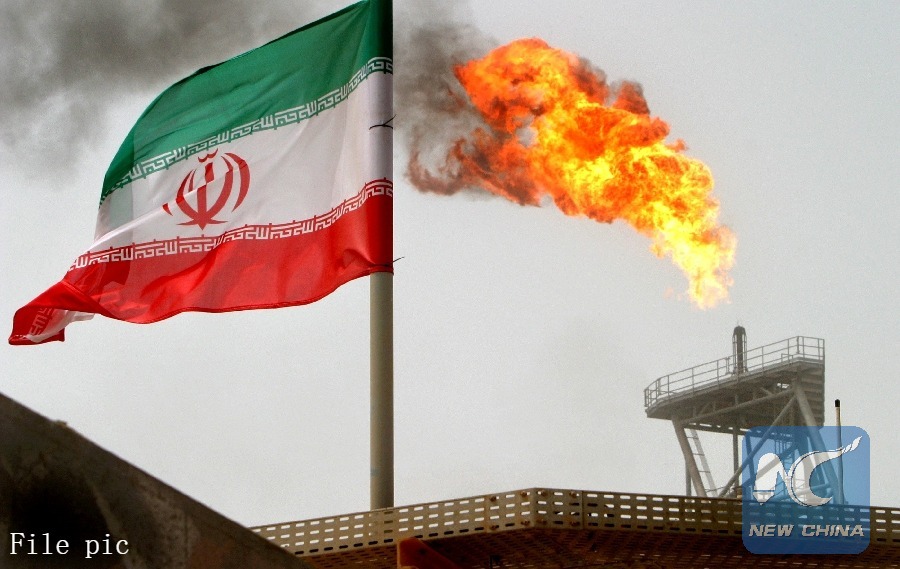
File photo: A gas flare on an oil production platform in the Soroush oil fields is seen alongside an Iranian flag in Iran on July 25, 2005. (Reuters)
TEHRAN, Oct. 14 (Xinhua) -- Iranian President Hassan Rouhani said on Sunday that the U.S. sanctions on Iran's oil exports in Nov. would have "no impact" on the economy and the lives of people.
The enemy has waged a psychological war and "has already done whatever it could have done," Rouhani said in the University of Tehran on Sunday.
The impending Nov. 4 sanctions on Iran's oil exports by the U.S. will have "no impact" on the state of affairs in the country, but the pressures by the current U.S. administration are aimed at a "regime change" in Iran, Rouhani was quoted by Press TV as saying.
"Over the past 40 years, there has not been a more spiteful team than the current U.S. government vis-a-vis Iran and the Islamic republic," Rouhani said.
"They started with a psychological war. Their next goal is an economic war in an attempt to portray (the Islamic republic) ineffective, and their ultimate goal is to delegitimize the system and change it," he added.
Iran has defeated the U.S. many times before and will thwart all its conspiracies with the unity and integrity among the Iranians again, he maintained.
Rouhani said that Washington has been isolated after its withdrawal from the 2015 Iranian nuclear deal, adding that except for a few countries, all others view the move as "illegal" and a "mistake."
U.S. President Donald Trump announced on May 8 his withdrawal from the Iranian 2015 international nuclear deal, also known as JCPOA, and vowed to return harshest sanctions in history against Iran.
The first round of renewed U.S. sanctions, imposed on August 7, prohibits Iran from the purchase of U.S. dollar and precious metals, part of a larger move that attempts to cut the country off from the international financial system.
A second tranche of U.S. sanctions on Iran's oil exports and gas sector are set to go into effect on Nov. 4.
Iran's First Vice President Es'haq Jahangiri said on Sunday that the U.S. is seeking to cut Iran's oil exports to zero and prevent Iran's imports of basic commodities including raw materials, Tasnim news agency reported.
Trump's goal by exerting energy sanctions on Iran is to minimize the country's sources of income in the current economic war against Iran, Jahangiri added.
Iran has no concerns over the potential impacts of returning U.S. sanctions on its oil exports given that it is already selling its crude oil higher than the price tag it has set in its annual budget plan, according to him.
Iran was selling its oil at above 80 U.S. dollars per barrel, Jahangiri said, adding that the country would be economically safe even if the sanctions slashed its oil sales by half.
The budget bill for the current Iranian year was devised on assumptions that the country would sell its oil at 55 dollars per barrel, according to Press TV.
Trump "mistakenly" thought Saudi Arabia would be able to replace the lost share of Iran's crude supply to the global market, Jahangiri said.
The reduced share of Iran in global oil market is the reason behind the recent surge in oil prices, the vice president noted.
Iran exported at least 2.5 million barrels per day of crude in April before Trump withdrew the U.S. from the deal.
Recently, Iran announced that South Korea, one of the country's major crude customers, has stopped crude imports from Iran.
Iran's Petroleum Minister Bijan Namdar Zanganeh has also said neither Saudi Arabia nor any other oil producer has such a capacity to replace Iran's oil in the market.

